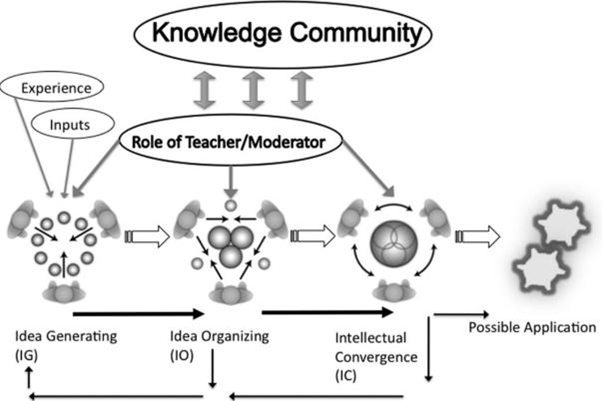Lesson 5 - Theories of Learning
26. Online Collaborative Learning
26.2. Core Design Principles of OCL
Harasim emphasizes the importance of three key phases of knowledge construction through discourse:
- Idea Generating: This is literally brainstorming, to collect the divergent thinking within a group.
- Idea Organizing: This is where learners compare, analyze and categorize the different ideas previously generated, again through discussion and argument.
- Intellectual Convergence: The aim here is to reach a level of intellectual synthesis, understanding and consensus (including agreeing to disagree), usually through the joint construction of some artifact or piece of work, such as an essay or assignment.
This results in what Harasim calls a Final Position, although in reality, the position is never final because for a learner, once started, the process of generating, organizing and converging on ideas continues at an ever deeper or more advanced level. The role of the teacher or instructor in this process is seen as critical, not only in facilitating the process and providing appropriate resources and learner activities that encourage this kind of learning, but also, as a representative of a knowledge community or subject domain, in ensuring that the core concepts, practices, standards, and principles of the subject domain are fully integrated into the learning cycle.
Harasim provides the following diagram to capture this process:

Another important factor is that in the OCL model, discussion forums are not addition or supplement to core teaching materials, such as textbooks, recorded lectures, or text in an LMS, but are the core component of the teaching. Textbooks, readings and other resources are chosen to support the discussion, not the other way round.
This is a key design principle, and explains why often instructors or tutors complain, in more ‘traditional’ online courses, that students don’t participate in discussions. Often this is because where online discussions are secondary to more didactic teaching, or are not deliberately designed and managed to lead to knowledge construction, students see the discussions as optional or extra work because they have no direct impact on grades or assessments.
It is also a reason why awarding grades for participation in discussion forums misses the point. It is not the extrinsic activity that counts, but the intrinsic value of the discussion, that matters (see, for instance, Brindley, Walti and Blashke, 2009). Thus although instructors using an OCL approach may use learning management systems for convenience, they are used differently from courses where traditional didactic teaching is moved online.